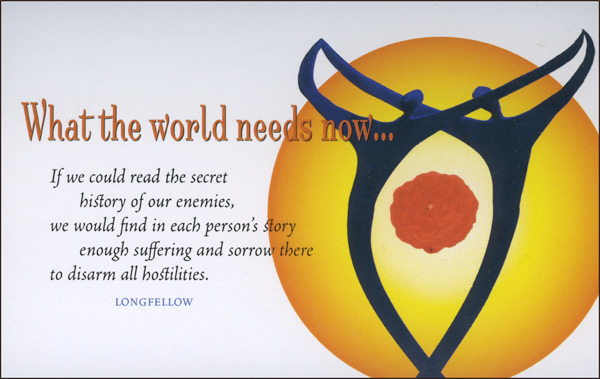Radical Love

I came across the idea of “Radical Love” in an interview on Engaged Buddhism as part of a conference on “The Politics of Love and Justice,” sponsored by the Network of Spiritual Progressives. (See references below.) As with acceptance and prayer I wanted to look more deeply into this aspect of our lives. I wanted to explore radical love particularly in how it relates to the commandment Love Thy Neighbor, and to social change.
We typically think of love as a feeling pertaining mainly to our personal lives; our immediate family, friends, intimate others. It’s warm and sentimental, the love that creates Hallmark cards. It’s a beautiful, deep love that comes effortlessly. and it’s easy to love those who love us. But to paraphrase what Jesus says in Matthew 5:46-47: What’s the big deal about loving people who love you?
If we reach outside the circle of loved ones, we touch our neighbors. In this era of the global village, everyone is our neighbor. But how do we love all 7.2 billion of us? I don’t believe we are being asked to have the same affection for all beings that we have for our loved ones. What we are being asked is to make a commitment to the well-being of every living thing, the earth included. It means to feel a deep sense of connection and belonging with all life, to know we are not separate. We are interdependent, and responsible for fostering thoughts and actions that are in service to life.
If we have no peace, it is because we have forgotten that we belong to each other.
Mother Teresa
But how do we go about loving our enemies as Jesus instructs us?
Longfellow writes:
If we could read the secret history of our enemies,
We would find in each person’s story
Enough suffering and sorrow there
To disarm all hostilities.
There but for the grace of God go I.
That is a wisdom saying that will always soften my heart about someone who feels like an “enemy” to me or to the planet. I can try to imagine and understand where someone is coming from, what her history is, what his motivations might be. In his book, Creating A World That Works For All, Sharif Abdullah speaks to this practice of inclusivity. “Think of that person as just like you, with the same needs, fundamental desire to be happy, to avoid suffering, the same loneliness, fear of the unknown, the same secret areas of sadness, the same half-acknowledged feelings of helplessness. You will find that if you really do this, your heart will open for the person and love will be present between you.”
We have only to think of Gandhi, King, Thich Nhat Hanh, Nelson Mandela, and many others to see how to love our enemies, and still fight successfully against destructive policies, attitudes, and injustice.
Love is the essence of nonviolence.
Thich Nhat Hanh
Fr. Richard Rohr gives us other ways to consider love:
Love is a science.
Love is a discipline.
Love is a decision.
Love is an artform.
Love takes an ability to be present.
When you don’t love it destroys you.
Love is the supreme work of our entire lifetime.
I keep a Post-it on my computer that says, “Work at loving with all your might.” Sometimes it absolutely takes all my might to have much empathy and compassion for certain political figures who advocate for everything but health and justice for people and the planet, but I know it’s the Way, and I will keep on the path as best I can.
Because I always have a choice, I choose love.
Deepak Chopra
REFERENCES
The image for this Reflection is a postcard featuring the Longfellow quote. It can be found at Desert Rose Press in the Card section.
The “Politics of Love and Justice” program is a series of “mentoring sessions” bringing together spirituality and activism. If you register you will get audio downloads for each interview. Otherwise, I’m told if you sign up with your name and email address, you will have access to three interviews at no charge. Alternatively, all interviews are available free to members of the Network of Spiritual Progressives. Here is a pdf of “Engaged Buddhism.” You’ll find other excellent interviews with people like David Korten and Marianne Williamson on such topics as "Resisting Structural Evil: Love as an Ecological-Economic Vocation," "Conscious Politics," and "Nonviolence as an Act of Love."
Back to Blog